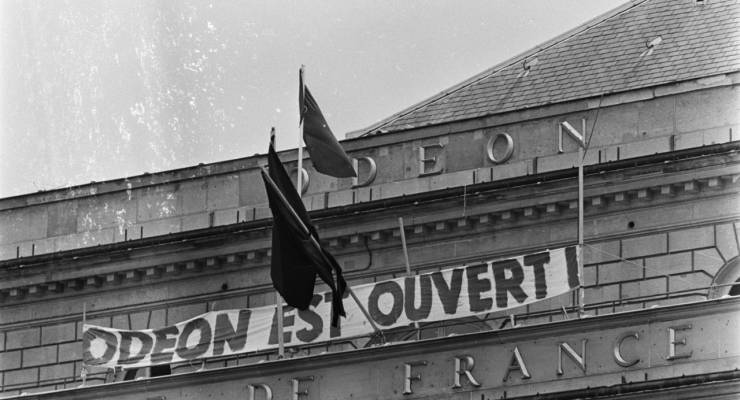
The Odéon-Théâtre de France, occupied by protestors for a month from May 1968
Fifty years ago this month, many millions of workers, students, and others uncategorised by history, came together to “shit the bed”. Such was the view of Charles de Gaulle, a man whose French presidency survived a general strike, and one whose talent for diminishing opposition survives to the present. By the end of May 1968, the General had amassed great support through his representation of protest: those who spoke were at once incontinent children to be pitied and “tyrants” to be feared.
A half-century later, Macron calls on this legacy, and workers who protest their conditions become “professional troublemakers” — again, privileged, powerful cynics who are also kids who crap the bed.
This describes the most prevalent legacy of Paris, 1968. Or, rather, the bifurcation of the moment into two legacies. There is that enduring and peculiar view of all unruly mass protest as the powerful work of Soviets, cf. Jordan Peterson. Then there is the record that appears sympathetic, but is ultimately crap-the-bed belittling. When we read so much about the “cultural” legacy of May 1968 and so little of the political legacy provided by the many who effectively shut down a nation state, we think about naïve kids.
It is true that May 1968 may be traced back to March 1968, the month in which students from a brand new suburban university campus became frustrated, inter alia, with life inside a building site. But, it’s no truer that the events of that year were any more Soviet-led — the popular graffito of May “all power to the imagination” was aimed at the French tankies of the time who sought “all power to the Soviets” — than it was led by students. Even the charismatic student leader Daniel Cohn-Bendit, known to the press of the West as “Red Danny”, sees the movement of which he, and so many Parisians, was a part as just one event inside a global complex of them.
The students, workers, families and migrants of Paris did not guilelessly soil themselves and leave nothing behind but a cultural turn, whose false recollection was Xeroxed this year at Paris Fashion Week: “Maria Grazia Chiuri, the first female designer of Christian Dior, opened Paris Fashion Week with a feminist bang on Tuesday with her 1968 inspired show.”
Paris is commonly revived by press as the precursor to the “pussy hat” protests of the present age. The repertoire of today’s Old New Left feminist protest has little more in common with May 1968 than its seeming sense of humour — although, I’d say that the situationist slogans of 50 years ago remain way funnier than “nasty Woman” T-shirts. Many in Paris developed a political consciousness within weeks, and this led to the paralysis of a nation. Many pussy hat wearers remain paralysed in the apolitical memory of groovy students who craved only cultural liberation. In fact, students were not only able to make concrete material demands, but looked far beyond their own class and identity groups to make demands for all.
The women who now march in pink hats have real grievances, of course. That they are unable to understand or act upon these grievances within the context of a nation-state, era or globalised economy is not a legacy of Paris. These protests have their basis in the same, far more successful revolution that produced Macron — a man, you may recall, who was “inspiring” to pussy-hat feminists for the advanced age of his bride.
Philosopher John Gray writes this month that Paris created the conditions for neoliberalism. It’s a more interesting take than the Paris Gave Us The Pussy Hat type, but is, in my view, diminishing in the bed-pooping style nonetheless. It is Gray’s view that the Paris rejection of social mores and gender norms not only facilitated but permitted the neoliberal tendency to mask the power of capital with an appearance of cultural tolerance.
I’d just say that it is the neoliberal tendency to mask the power of overtly anti-capitalist protest with false memories of horny students. Capitalism has shown no little talent for dressing up its failure as success with many countervailing acts, such as the neoliberal revolution. And our press is rather good at weaving a hostile moment of opposition to capitalism into a pussy hat.








Crikey is committed to hosting lively discussions. Help us keep the conversation useful, interesting and welcoming. We aim to publish comments quickly in the interest of promoting robust conversation, but we’re a small team and we deploy filters to protect against legal risk. Occasionally your comment may be held up while we review, but we’re working as fast as we can to keep the conversation rolling.
The Crikey comment section is members-only content. Please subscribe to leave a comment.
The Crikey comment section is members-only content. Please login to leave a comment.